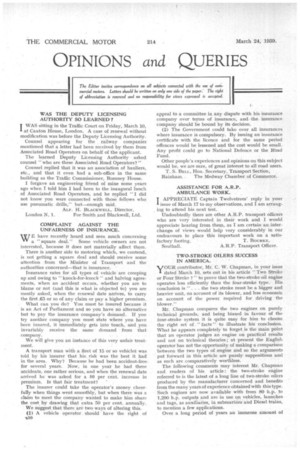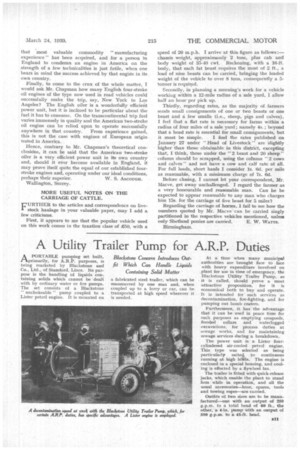OPINIONS and QUERIES The Editor invite,s correspondence on all subjects
Page 36

Page 37

If you've noticed an error in this article please click here to report it so we can fix it.
connected with the use of commercial motors. Letters should be written on only one side of the paper. The right of abbreviation is reserved and no responsibility for views expressed is accepted.
WAS THE DEPUTY LICENSING AUTHORITY SO LEARNED?
I WAS sitting in the Traffic Court on Friday, March 10,
at Caxton House, London. A case of renewal without modification was before the Deputy Licensing Authority.
Counsel appearing for the railway companies mentioned that a letter had been received by them from Associated Road Operators on behalf of the applicant.
The learned Deputy Licensing Authority • asked counsel " who are these Associated Road Operators?"
Counsel replied that it was an association of hauliers, etc., and that it even had a sub-office in the same building as the Traffic Commissioner, Romney House.
I forgave an engineering friend of mine some years ago when I told him I had been to the inaugural lunch of Associated Road Operators, and he replied " I did not know you were connected with those fellows who use pneumatic drills," but--enough said.
ALF. H. BLACKWELL, Director, London N. 1. For Smith and Blackwell, Ltd.
COMPLAINT AGAINST THE UNFAIRNESS OF INSURANCE.
E have recently heard and seen much concerning a "square deal." Some vehicle owners are not interested, because it does not materially affect them. There is another side to motoring which, we contend, is not getting a square deal and should receive some attention from the Minister of Transport and the authorities concerned—that is insurance.
Insurance rates for all types of vehicle are creeping up and owing to " knock-for-knock" and halving agreements, when an accident occurs, whether you are to blame or not (and this is what is objected -to) you are mostly asked, when the renewal date arrives, to carry the first £5 or so of any claim or pay a higher premium.
What can you do? You must be insured because it is an Act of Parliament and so you have no alternative but to pay the insurance company's deinand. If you try another company you must state where you have been insured, it immediately gets into touch, and you invariably receive the same demand from that company.
We will give you an instance of this very unfair treat ment. • A transport man with a fleet of 15 or so vehicles was told by his insurer that his, risk was the best it had in the area. Why? Because he had been accident-free for several years. Now, in one year he had three accidents, one rather serious, and when the renewal date arrived he was asked for a SO per cent. increase in premium. Is that fair treatment? '
The insurer could take the operator's money cheer fully when things went smoothly, but when there was a claim to meet the company wanted to make him share
the cost by drawing that extra 50 per cent. annually. We suggest that there are. two ways of altering this. (1) A. vehicle operator should have the right of 110
appeal to a committee in any dispute with his insurance company over terns of insurance, and • the insurance company should be bound by its decision.
(2) The Government could take over all insurances where insurance is compulsory. By issuing an insurance certificate with the licence and for the same period offences would be lessened and the cost would be small. Any profit could go to National Defence or the Rbad Fund.
Other people's experiences and opinions on this subject would be, we are sure, of great interest to all road users. T. S. BELL, Hon. Secretary. Transport Section, Rainham. The Medway Chamber of Commerce.
ASSISTANCE FOR A.R.P.
AMBULANCE WORK.
I APPRECIATE Captain Twelvetrees' reply in your 'issue of March 17 to my observations, and I am arranging to attend his next test.
Undoubtedly there are other A.R.F. transport officers who are very interested in their work and I would appreciate hearing from them, as I am certain an interchange of views would help very considerably in our endeavours to place this important work on a satis factory footing. T. BOURXE, Southall. A.R.P. Transport Officer.
TWO-STROKE OILERS SUCCESS IN AMERICA.
V OUR contributor, Mr. C. W. Chapman, in your issue dated March 10, sets.out in his article "Two Stroke or Four Stroke ? "to prove that the two-stroke oil engine operates less efficiently than the four-stroke type. His conclusion is " . the two stroke must be a bigger and heavier unit, on account of its blower, and less economic on account of the power required for driving the blower."
Mr. Chapman compares the two engines on purely technical grounds, and being biased in favour of the four-stroke system it -is quite easy for him to choose the right set of " facts " to illustrate his conclusion. What he appears completely to forget is the main point that an operator judges an engine on practical results and not on technical theories ; at present the English operator has not the opportunity of making a comparison between the two types of engine and so the arguments put forward in this article are purely suppositions and as such are, comparatively worthless.
The following comments may interest Mr. Chapman and readers of his article : the two-stroke engine referred to is the latest of a long line of two-stroke oilers produced by the manufacturer concerned and benefits from the many years of experience obtained with this type. Such engines are now available • with. from 80 h.p. to 1.200 h.p, outputs and are in use on .vehicles, launches and tugs, as auxiliaries, in submarines -and Diesel trains, to mention a few, applications.
Over a long period of Years an immense amount of that most valuable commodity " manufacturing experience' has been acquired, and for a person in England to condemn an engine in America on the strength of a few technicalities is just futile, when one bears in mind the success achieved by that engine in its own country.
Finally, to come to the crux of the whole matter, I would ask Mr. Chapman how many English four-stroke oil engines of the type now used in road vehicles could successfully make the trip, say, New York to Los Angeles? The English oiler is a wonderfully efficient power unit, but it is inclined to be particular about the fuel it has to consume. On the transcontinental trip fuel varies immensely in quality and the American two-stroke oil engine can be relied upon to operate successfully anywhere in that country. From experience gained, this is not the case with engines of European origin tested in America.
• Hence, contrary to Mr. Chapman's theoretical conclusions, it can be said that the American two-stroke oiler is a very efficient power unit in its own country and, should it ever become available in England, it may prove itself quite the equal of our established fourstroke engines and, operating under our ideal conditions,
perhaps their superior. W. S. ASCOLTGH. Wallington, Surrey.
MORE USEFUL NOTES ON THE CARRIAGE OF CATTLE.
FURTHER to the articles and correspondence on livestock haulage in your valuable paper, may I add a few criticisms.
First, it appears to me that the popular vehicle used on this work comes in the taxation class of £50, with a speed of 20 m.p.h. I arrive at this figure as follows:— chassis weight, approximacely 2 tons, plus cab and body weight of 35-40 cwt. Reckoning, with a 16-ft. body, that each fat beast requires the most of 2 ft., a load of nine beasts can be carried, bringing the loaded weight of the vehicle to over 8 tons, consequently a 5tonner is requir,ed.
Secondly, in planning a morning's work for a vehicle working within a 12-mile radius of a sale yard, I allow half an hour per pick up.
Thirdly, regarding rates, as the majority of farmers sends small consignments of one or two beasts or one beast and a few smalls (i.e., sheep, pigs and calves), I feel that a flat rate is necessary for farms within a radius of four miles of a sale yard; namely 4s. ; beyond that a head rate is essential for small consignments, but it must be simple. I find the rates published on January 27 under "Head of Livestock" are slightly higher than those obtainable in this district, excepting that, I think, those under the "2 beast and 20 sheep" column should be scrapped, using the column "2 cows and calves " and not have a cow and calf rate at all. For full loads, short hauls I consider is. 6d. per mile as reasonable, with a minimum charge of 'is. 6d.
Before closing, I cannot let your correspondent, Mr. Macve, get away unchallenged. I regard the farmer as a very honourable and reasonable man. Can he be expected to appear reasonable to any man who charges him 15s for the carriage of five beast for 5 miles?
Regarding the carriage of horses, I fail to see bow the numbers quoted by Mr. Macve can be carried singly partitioned in the respective vehicles mentioned, unless
only Shetland ponies are carried. E. W. WATTS. Birmingham.




















































































